- Home
- Jr. Horatio Alger
Bernard Brooks' Adventures: The Experience of a Plucky Boy
Bernard Brooks' Adventures: The Experience of a Plucky Boy Read online
Produced by David Widger from page images generouslyprovided by The Internet Archive
BERNARD BROOKS' ADVENTURE.
The Experience of a Plucky Boy
By Horatio Alger, Jr.
A. L. Burt Company, Publishers New York
Copyright, 1903,
BERNARD BROOKS' ADVENTURES.
CHAPTER I. BERNARD BROOKS.
|You're a bad lot, Bernard Brooks. I don't think I ever knew a wussboy."
"Thank you for the compliment, Mr. Snowdon. Let me suggest, however,that _wuss_ is hardly correct English."
The speaker was fifteen years of age, but as tall as most boys ofseventeen. He had a bold, aggressive manner, which he only assumed withthose he thought were hostile or unfriendly.
He could be a devoted friend, and a loyal subordinate to one who gainedhis good will. Mr. Snowdon he did not look upon as a friend, though hehad been placed in his charge two months before by a cousin of hisdeceased father.
Ezekiel Snowdon, a man of perhaps sixty, tall and with stoopingshoulders, colored with anger at the boy's sarcastic words.
He claimed to have been educated at a small Western college, and on thestrength of it had established himself in the country and advertised forprivate pupils at a low rate.
These were mostly young, and not competent to see his deficiencies, butBernard was old enough and well enough educated to perceive and commenton them. This greatly annoyed Mr. Snowdon, who felt that the boy did nottreat him with proper respect.
"Quit your impudence!" said Snowdon with a vicious look in his greenishlived eyes. "I don't need no criticisms from a whipper snapper likeyou."
"I intended it for your benefit, Mr. Snowdon," said Bernard demurely."Besides, you criticise me. You called me a bad lot."
"And so you are. A wuss--a worse boy I never seen."
"Saw would be more correct, Mr. Snowdon."
"Young man, you'd better look out. I won't submit to your aggravatingimpudence. Besides, you are ignorant of the fact that Chaucer andSpenser use seen for saw. Them are my favorite poets, so it is notstrange that I should occasionally make use of their diction."
"Thank you for the information, Mr. Snowdon. I did not know that you hadsuch high authority. I have read a little of Chaucer and Spenser, and Inever observed the word you mention."
"Perhaps you have not read the same works as I," said Mr. Snowdon.
"Very likely," remarked Bernard, struggling to suppress a smile.
"It might be well another time to be sure of your ground before you tryto criticise your elders."
"Yes, sir," said Bernard, with a meekness which the twinkle in his eyebelied.
"A little knowledge is a dangerous thing," remarked Mr. Snowdon withdignity.
"I am sure you are a good judge on that point, Mr. Snowdon," saidBernard with demure face, so that his elder did not catch the covertsarcasm.
"I am glad you give me credit for something," rejoined the teacher. "Nowyou hear what I say. I won't have you goin' round with that Nat Barclay,as you did last evening."
"What's the matter with Nat Barclay?"
"He was once a pupil of mine, and he defied my authority, so I had todischarge him."
"That isn't what he says, Mr. Snowdon."
"What does he say?"
"He says that he found out you didn't know enough to teach him, and gothis father to take him away from your school."
"Then the boy lied," said Mr. Snowdon, coloring deeply. "I'd like tothrash him."
"I dare say you would, Mr. Snowdon, but I don't think it would beexactly safe. Nat wouldn't stand it."
"He'd have to stand it, if I took it into my head to chastise him."
"If you had a scrimmage, I'd bet on Nat," said the bold pupil.
"Do you consider _scrimmage_ a classical word?" asked Mr. Snowdon with asneer.
"Well, not exactly. I suppose you know that Dryden uses it," saidBernard with a bold flight of imagination.
Now Mr. Snowdon was not sufficiently versed in English classical writersto know whether this statement was correct or not. So he equivocated toconceal his ignorance.
"Dryden is not always a correct writer," he added. "I never advise mypupils to imitate him. But that is neither here nor there. I have toldyou that I don't want you to go round with Nat Barclay."
"Why not? I am sure he is of good family. His father is a clergyman."
"It is from respect to his father that I did not chastise him when hewas in my school."
"He says his father does not think much of your scholarship."
"It is because he has poisoned his father's mind against me by false andmendacious charges and statements. I can afford to look upon these withcontempt since my alma mater bestowed upon me the honorary degree of P.D. at the last commencement."
"What does P. D. stand for?"
"Doctor of Philosophy," answered Mr. Snowdon in a lofty tone.
"Oh, I thought it might mean something else."
"What?" asked Mr. Snowdon suspiciously.
"Oh, it isn't material. I don't want to display my ignorance," saidBernard meekly.
"I am glad you are becoming sensible."
Mr. Snowdon did not press the question, as he conjectured that P. D., asunderstood by Bernard, would stand for something far from complimentary.
"I am going to the post-office, Mr. Snowdon. Can I do anything for you?"
"You may inquire if there are any letters for me."
"All right, sir."
Bernard was about to leave the room, when he turned as if struck by asudden thought.
"May I inquire, Mr. Snowdon," he asked, "what authority you have forcalling me 'a bad lot'?"
"I have the authority of Cornelius McCracken, your guardian."
"Does he say I am a bad lot?" asked Bernard, his brow contracting.
"Yes, he did."
"When did he say it?"
"In a letter I received last week."
"May I see the letter, Mr. Snowdon?"
"Yes," answered the teacher, "if it will give you any satisfaction."
"It will give me satisfaction to know exactly how he expresses himselfin speaking of me."
Ezekiel Snowdon opened his desk, and took out a letter postmarked NewYork.
"There is the letter," he said, handing it to Bernard with a malicioussmile. "Out of regard for your feelings I had not intended to show it toyou, but since you desire it, I feel that I shall not be responsible forany wound your pride may receive." Bernard did not answer this speech,but taking the letter tendered him, opened and hastily read it. This wasthe letter:
"Ezekiel Snowdon, Esq.:
"Dear Sir--I am in receipt of your letter, complaining of my ward,Bernard Brooks. You say you find him disrespectful and insubordinate,and upon this ground you ask me to increase the price I pay for hiseducation. I am quite aware that he is a bad lot. You will do me thejustice to remember that in placing him under your charge I did not seekto extenuate the boy's faults. I told you that he was obstinate,independent, and headstrong. You told me that you had had great successin managing refractory boys, and were willing to undertake him. Underthese circumstances I cannot feel that I am called upon to increase theremuneration agreed upon between us in the first place. Should you findhim impudent, I shall not object to your inflicting upon him suchpunishment--even castigation--as in your opinion he may require. Moremoney, however, I cannot pay you, as it draws heavily upon my resourcesto pay the amount already agreed upon.
"Yours respectfully,
"Cornelius McCracken."
"Now I hope you are satisfied," said Mr. Snowdon, as he receiv
ed theletter back.
"I am satisfied that you have not misrepresented Mr. McCracken."
"You see he gives me complete authority over you."
"I see he does," returned Bernard in a peculiar tone.
"May I ask, Mr. Snowdon," he added, after a thoughtful pause, "whethermy guardian ever told you about how I was situated?"
"In what way?"
"As to money matters. Did he tell you whether or not I had any fortune?"
"He said you had not."
"Did he tell you that I was wholly dependent upon his charity?"
"He gave me that impression. You ought to feel very grateful to him forhis great-hearted liberality in thus defraying the expenses of adestitute orphan."
"Probably I am as grateful as the occasion requires," rejoined Bernardgravely. "I will inquire for letters for you."
As the boy went out Mr. Snowdon looked after him thoughtfully.
"I hate that boy!" he murmured to himself. "It would do me good to floghim. His guardian has given me leave, and I think that I will soon findan opportunity to avail myself of it."

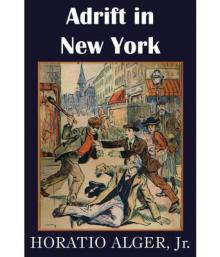 Adrift in New York: Tom and Florence Braving the World
Adrift in New York: Tom and Florence Braving the World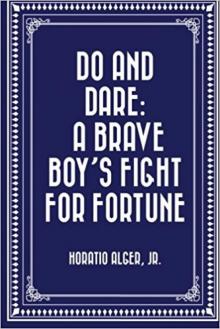 Do and Dare — a Brave Boy's Fight for Fortune
Do and Dare — a Brave Boy's Fight for Fortune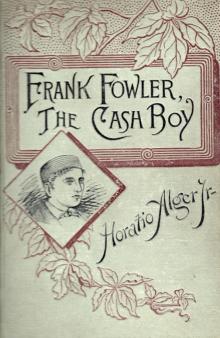 The Cash Boy
The Cash Boy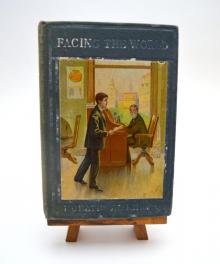 Facing the World
Facing the World The Young Explorer; Or, Claiming His Fortune
The Young Explorer; Or, Claiming His Fortune The Store Boy
The Store Boy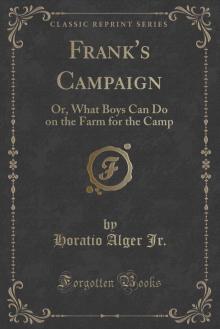 Frank's Campaign; Or, The Farm and the Camp
Frank's Campaign; Or, The Farm and the Camp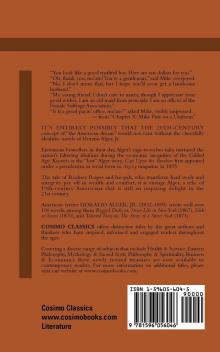 Cast Upon the Breakers
Cast Upon the Breakers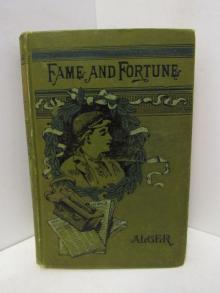 Fame and Fortune; or, The Progress of Richard Hunter
Fame and Fortune; or, The Progress of Richard Hunter The Errand Boy; Or, How Phil Brent Won Success
The Errand Boy; Or, How Phil Brent Won Success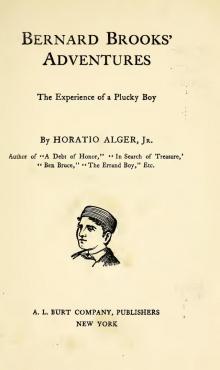 Bernard Brooks' Adventures: The Experience of a Plucky Boy
Bernard Brooks' Adventures: The Experience of a Plucky Boy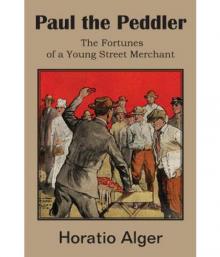 Paul the Peddler; Or, The Fortunes of a Young Street Merchant
Paul the Peddler; Or, The Fortunes of a Young Street Merchant Brave and Bold; Or, The Fortunes of Robert Rushton
Brave and Bold; Or, The Fortunes of Robert Rushton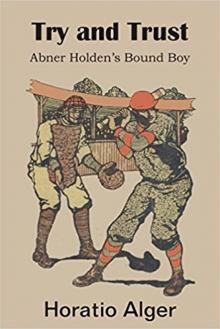 Try and Trust; Or, Abner Holden's Bound Boy
Try and Trust; Or, Abner Holden's Bound Boy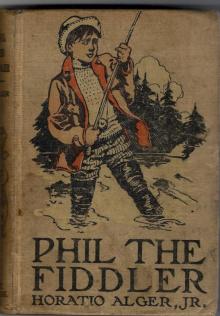 Phil, the Fiddler
Phil, the Fiddler In A New World; or, Among The Gold Fields Of Australia
In A New World; or, Among The Gold Fields Of Australia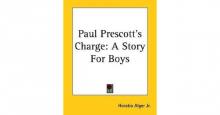 Paul Prescott's Charge
Paul Prescott's Charge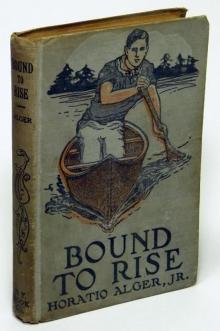 Joe's Luck; Or, Always Wide Awake
Joe's Luck; Or, Always Wide Awake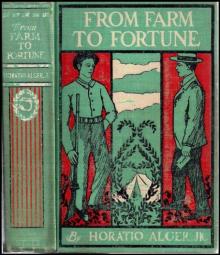 From Farm to Fortune; or, Nat Nason's Strange Experience
From Farm to Fortune; or, Nat Nason's Strange Experience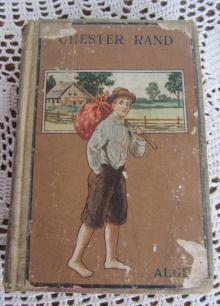 Chester Rand; or, The New Path to Fortune
Chester Rand; or, The New Path to Fortune Driven from Home; Or, Carl Crawford's Experience
Driven from Home; Or, Carl Crawford's Experience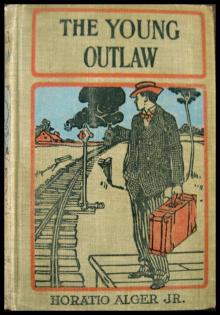 The Young Outlaw; or, Adrift in the Streets
The Young Outlaw; or, Adrift in the Streets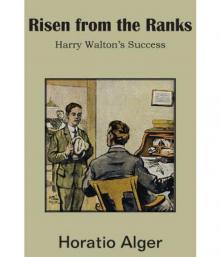 Risen from the Ranks; Or, Harry Walton's Success
Risen from the Ranks; Or, Harry Walton's Success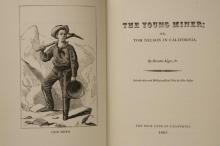 The Young Miner; Or, Tom Nelson in California
The Young Miner; Or, Tom Nelson in California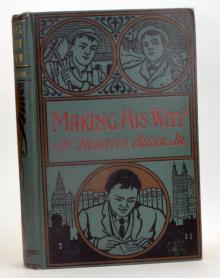 Making His Way; Or, Frank Courtney's Struggle Upward
Making His Way; Or, Frank Courtney's Struggle Upward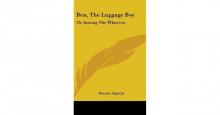 Ben, the Luggage Boy; Or, Among the Wharves
Ben, the Luggage Boy; Or, Among the Wharves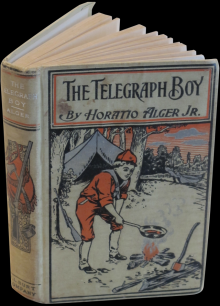 The Telegraph Boy
The Telegraph Boy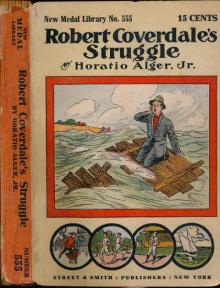 Robert Coverdale's Struggle; Or, on the Wave of Success
Robert Coverdale's Struggle; Or, on the Wave of Success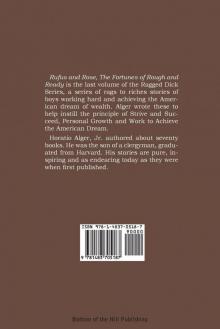 Rufus and Rose; Or, The Fortunes of Rough and Ready
Rufus and Rose; Or, The Fortunes of Rough and Ready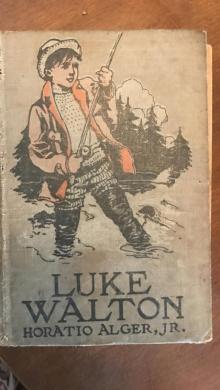 Luke Walton
Luke Walton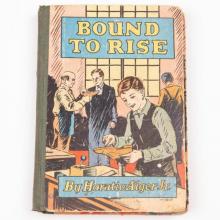 Mark Mason's Victory: The Trials and Triumphs of a Telegraph Boy
Mark Mason's Victory: The Trials and Triumphs of a Telegraph Boy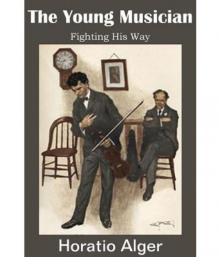 The Young Musician; Or, Fighting His Way
The Young Musician; Or, Fighting His Way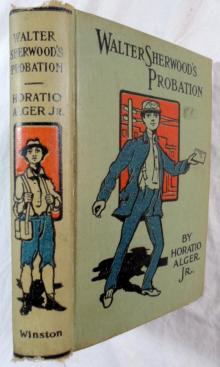 Walter Sherwood's Probation
Walter Sherwood's Probation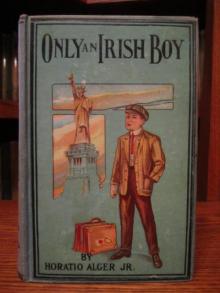 Only an Irish Boy; Or, Andy Burke's Fortunes
Only an Irish Boy; Or, Andy Burke's Fortunes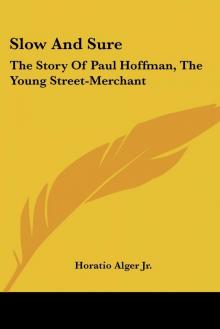 Slow and Sure: The Story of Paul Hoffman the Young Street-Merchant
Slow and Sure: The Story of Paul Hoffman the Young Street-Merchant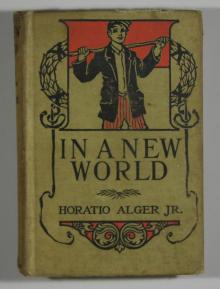 Herbert Carter's Legacy; Or, the Inventor's Son
Herbert Carter's Legacy; Or, the Inventor's Son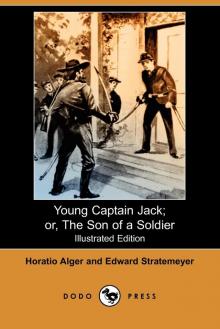 Young Captain Jack; Or, The Son of a Soldier
Young Captain Jack; Or, The Son of a Soldier Timothy Crump's Ward: A Story of American Life
Timothy Crump's Ward: A Story of American Life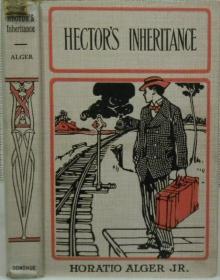 Hector's Inheritance, Or, the Boys of Smith Institute
Hector's Inheritance, Or, the Boys of Smith Institute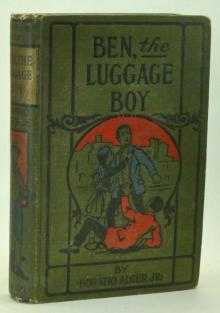 Ben's Nugget; Or, A Boy's Search For Fortune
Ben's Nugget; Or, A Boy's Search For Fortune